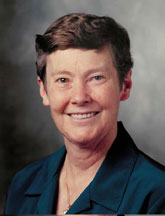

Thursday - April 16, 2009
SLAC Today is
available online at:
http://today.slac.stanford.edu
In this issue:
Protein Discovery Opens Door to Better Antibiotics
Next Wednesday Is Earth Day
LCLS Workshop Tackles Extremes
Exploratorium Honors Helen Quinn
 |
 |
|
Thursday - April 16, 2009 |
Protein Discovery Opens Door to Better AntibioticsBacterial and viral drug resistance in several disabling diseases might be better handled in the future, thanks in part to recent research at SLAC's Stanford Synchrotron Radiation Lightsource. In a paper published today in Nature, University of Iowa chemists working with SSRL protein crystallographer Irimpan Mathews report their discovery that certain organisms—including the pathogens that cause anthrax, tuberculosis, botulism and Lyme disease—manufacture the DNA base thymidylate differently than humans. It now seems possible to block the production of thymidylate in pathogens without impairing the needed production in humans. This revelation opens the way for a whole new class of drugs that prevent these diseases from replicating in the body without impairing the body's own cells. "If you can stop the pathogens from making their thymidylate, you can kill them," said Mathews. "Now that we know the mechanism by which they multiply, we can think of designing drugs that block that process—even for diseases that have previously shown antibiotic resistance." Learn more about this discovery in a University of Iowa press release issued today, as well as the scientific paper and a News and Views discussion from the journal Nature (subscription required for full text). Next Wednesday Is Earth DayThe Department of Energy's theme for this year's Earth Day, which falls on April 22, is "New Energy for America." SLAC will celebrate Earth Day in the Panofsky Auditorium Breezeway between 10:00 a.m. and 2:00 p.m. next Wednesday. Vendors will be on hand from companies like Akeena Solar, PG&E, Grainger and Jensen Landscaping, to promote green products and consumer choices leading to a green lifestyle at home and in the workplace. Activities will feature product displays—including a smart car—educational material, and other giveaways. Make sure to come before 2:00 p.m. to place your name in the raffle for a new cruiser bicycle. Don't miss out! LCLS Workshop Tackles ExtremesAfter a long day of fruitful discussion, participants in the Matter in Extreme Conditions workshop chatted over refreshments outside the SLAC Linear Café (Photo by Lauren Schenkman.)
Monday through Wednesday of this week, SLAC played host to the Matter in Extreme Conditions workshop, an international group of more than 80 physicists and materials scientists interested in using the Linac Coherent Light Source to explore the properties of matter at extraordinarily high temperatures and pressures. These researchers are potential users of the Matter in Extreme Conditions instrument, or MECi, in the design phase for Hutch 6 of the LCLS. The LCLS's X-ray pulses are so short and bright, they can heat matter to several million kelvins before it has time to expand, enabling study of states of matter otherwise found only at the cores of giant planets, said Oxford University professor and workshop participant Justin Wark. Over the course of the three days, Wark and other future users defined and discussed the tailored X-ray beam properties and diagnostic equipment their experiments will require. Their input will shape the MECi's design, which will likely be finalized within the year. "We have a straw man design, but this is the opportunity for the community to say what they need and want," said Jerry Hastings, deputy head of the LCLS Experimental Facilities Division and workshop chair. The workshop was sponsored in part by the University of California's Institute for Material Dynamics in Extreme Conditions and the United Kingdom's Science and Technology Facilities Council, or STFC. As Chief Scientist for the STFC Photon Science Research Institute, Wark was also present at last year's signing of a Memorandum of Understanding that the UK would contribute to the construction of the MECi. "This is the next step in the process of the UK's involvement in making available a unique instrument for the scientific community," Wark said.  SLAC theorist Helen Quinn.
Exploratorium Honors Helen QuinnThe Exploratorium, a San Francisco science museum, will honor SLAC physicist Helen Quinn at its 32nd annual awards banquet next month. This year's dinner celebrates outstanding and inspiring women in science. Quinn is one of five honorees, who "paved the way for future female scientists while making an indelible mark in their respective fields," according to an Exploratorium press release. "This is a nice award," Quinn said. "It's a different community recognizing the work I've been doing. And I'm honored to be seen as a positive role model for girls thinking about a career in science." Quinn is no stranger to such recognition. Among her other honors, the American Physical Society named Quinn an Outstanding Referee for 2009, and she received the prestigious Dirac Medal in 2000 and the Klein Medal from the Royal Swedish Academy of Sciences in 2008. The award reception and dinner will take place May 18 at the Exploratorium. Also recognized are computer scientist Frances Allen, arts professor Red Burns, Google designer Marissa Mayer, and Harriet Wallberg-Henriksson, president of Sweden's Karolinska Institute. |
SLAC Library Use Survey Events (see all | submit)
Access (see all)Announcements
|
|
| | ||
|
|
||
 <%
Response.AddHeader "Last-modified", getArticleDate()
'Response.AddHeader "Last-modified","Mon, 01 Sep 1997 01:03:33 GMT"
'Monday, December 06, 2010
%>
<%
Response.AddHeader "Last-modified", getArticleDate()
'Response.AddHeader "Last-modified","Mon, 01 Sep 1997 01:03:33 GMT"
'Monday, December 06, 2010
%>View online at http://today.slac.stanford.edu/. |
||